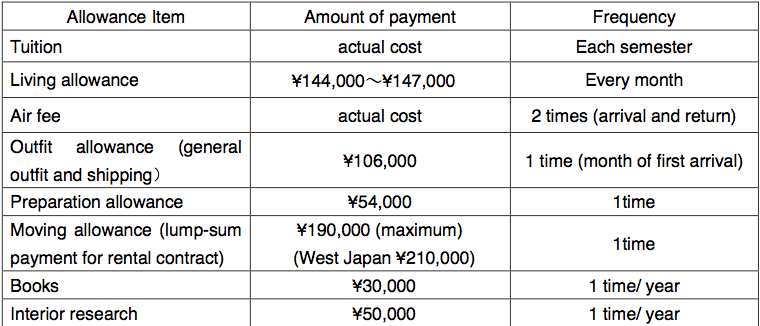At the 5th Tokyo International Conference on African Development (TICAD V) held in Yokohama in 2013, the Japanese Government stated its policy of strengthening support for the on-going dynamic growth of Africa with stronger public-private partnerships.
Japanese Prime Minister Shinzo ABE announced the “ABE Initiative” or “African Business Education Initiative for Youth“, a strategic five-year plan providing 1,000 youths in Africa with opportunities to study at Japanese universities as well as do internships at Japanese enterprises to foster Africa’s sustainable and sound industrial development.
This Program offers scholarships for youths to study master’s courses in Japanese universities as well as internship opportunities during their stay in Japan.
The objective of the ABE Initiative master’s degree and internship program is to support young personnel who have the potential to contribute to the development of industries in Africa. This program offers opportunities for young African men and women to study at master’s courses in Japanese universities as international students (hereafter referred to as participants) and experience internships at Japanese enterprises. The aim is for them to develop effective skills in order for them to contribute to various fields.
Beyond acquisition of skills and knowledge, this program also intends to cultivate excellent personnel who can recognize and understand the contexts of Japanese society and systems of Japanese enterprises. The expected outcome of the program is a network of potential contributors to the development of African industries who will also lead Japanese businesses to engage further in economic activities in Africa.

Target Participants
Target participants are from among the following three types of personnel.
- Persons from the Private Sector
Young individuals who are or will be involved in economic activities in the local private sector maintaining and developing strong ties with Japanese companies. - Governmental Officials
Young officials, such as civil servants, who take part in governance and policy-making in order to enhance industries to whose development Japanese companies can contribute. - Educators
Young individuals who are responsible for educating in Higher Education and TVET (Technical and Vocational Education and Training) institutions in Africa, in order to enhance capacity building in related industries.
Eligible applicants
- Citizens of one of the 54 African countries
- Between 22 and 39 years old (as of April 1st in the year of you arrival in Japan)
- A bachelor’s degree
- Applicants from government sectors/ educators who have both of the following:
-At least 6 months working experience at their current organization -Permission from their current organization to apply
- Have adequate English proficiency, both in written and oral communication (IELTS score of over 5.5 is preferred)
- Clearly understand the objective of this program and have a strong will to contribute to the industrial development of their country while broadening and strengthening the linkage between their country and Japan
- Not currently applying or planning to apply to scholarship programs offered by other organizations
- Have good health condition, both physically and mentally, to complete the program
- Not Military personnel
Number of Participants/ Durations
Participants will be selected and dispatched to Japan in 4 batches and the number of participants for each batch is planned as follows.
- 1st batch (arrival in Japan in 2014): 150 participants from 4 countries (Republic of Kenya, United Republic of Tanzania, Republic of Mozambique and Republic of South Africa)
- 2nd batch (arrival in Japan in 2015): 350 participants from 54 African countries
- 3rd batch (arrival in Japan in 2016): 300 participants from 54 African countries
- 4th batch (arrival in Japan in 2017): 100 participants from 54 African countries

Expenses:
- Tuition at Japanese university master’s degree programs
- Allowances for living expenses, outfit, shipping etc. See the box below for more details.
- Living Allowance: 144,000-147,00 yen/month
- Air Fee: Return Ticket (Arrival and Return)
- Outfit Allowance: 106,000 Yen – One Time (Month of First Arrival)
- Preparation Allowance: 54,000 yen – One Time
- Moving Allowance- 190,000 Yen
- Books Allowance- 30,000 Yen – One Time/Year
- Interior Research – 50,000 Yen – One Time/Year

- Around-trip airfare
- Expenses for support programs during the study in Japan, including the costs of observation tours
- Other costs should be covered by the participants’ organizations or other individuals.
Application Documents:
- Application Form
- Application Form (PDF)
- Recommendation Letter (Word)
- Recommendation Letter (PDF)
- University Information for the Applicants (PDF)
- (Application documents to be submitted) (PDF)
For More Information:

8 comments
i want to study in japanesse school
It is my glad if I get the chance to pursue my master program in Japanese university!! I think you will give me due consideration!!!!!!!!!!!!!
Iwould glad if I get the chance to pursue my master program in japanese university
I hope to be consider
Thanks
I.ll be so happy if get a place in japonese universities to continue my masters program
I would like to obtain an award to japanese university
Hello Dear/Sir madame
I have a dream to study and know more in my carrer.Japan is my favourite place in the whole world.where can i get the Application form for Jica scholarship for 2016?please email me soon if u coul see this message.
Thanks in advance
DENBERU BESFAT
i already received the information from our institute that is wollo university kombolcha institute of technology but ,i didnot get the form that could i applied and fill all the informations that comes from yours ,so if it is on line just be aware the exact website that could i fullfill all the informations.
Really, this is one of the fantastic opportunity that all underdeveloped countries student should apply for. But most of Ethiopian students have no English language profeciency Certificate to submit with the application form. So, is it possible to send recommendation letter from the university that confirm English as a medium of instruction during attending BA degree.
Keep Blessed